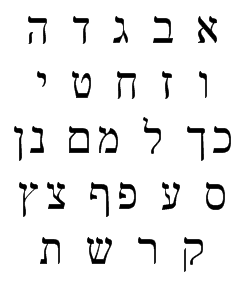Whether you’re looking to go to Israel, speak with friends or family, or explore Judaism with biblical Hebrew, we’ve put together an in-depth article to inform you just how hard Hebrew is to learn… it’s actually not hard and here’s why!
Be sure to check out our other articles
- Hebrew Reading Practice and Resources
- 5 Instagram Accounts to Follow if You’re Learning Hebrew
- 7 Best Books to Accelerate Your Hebrew Learning in 2020
Set Your Goals Modern Hebrew vs. Biblical Hebrew
Okay so most beginner language learners ask “how hard is X language to learn?” or “is X language easy to learn?” Like with any complex question… it all depends. But let’s break it down some more.
Before continuing, ask yourself this “What are my goals for learning Hebrew?” This will determine how “hard” or “easy” the language will be for you.
Are you looking to learn Modern Hebrew (mostly spoken in Israel, and by Israelis across the world)? Or are you looking to learn Biblical Hebrew? Modern Hebrew is derived from Biblical Hebrew, so both are quite similar in vocabulary however there are of course obvious differences such as the fact that biblical Hebrew is a Verb-Subject-Object language, while modern Hebrew is Subject-Verb-Object based.
This article will focus on learning Modern Hebrew. We’ll be answering your questions on biblical Hebrew another time.
How Hard is it to Learn Hebrew
If your aim is to just recite a few phrases with some friends or family members, you could probably say it’ll be quite easy to learn. Compare that to someone who wants to live in Israel and work for an Israeli company, their language learning process might be more arduous.
The next question you ought to ask yourself is “what languages do I know, or am I familiar with?” Bilinguals tend to have an easier time picking up another language compared to monolinguals. So if you’ve had any exposure to another language, it will probably come more easily. That being said, if this is your first language that you are studying, you can still achieve a high level of proficiency if you put in the hours and effort.
Is Modern Hebrew Hard for English Speakers?
Hebrew is a Semitic language while English is an Indo-European language. There are very few similarities right off the bat in terms of grammar, vocabulary, and writing when compared with English. This is often what intimidates English speakers to learn Hebrew.
However, you might find comfort knowing that Hebrew word order is similar to English, as mentioned before, it follows a general Subject-Verb-Object (SVO) word order. Although admittedly it is more flexible.
When you consider that you have to learn a new alphabet (Hebrew also has sounds we don’t use in English), new words that sound completely foreign, gendered nouns that we are not used to, and other alien concepts that we do not encounter as English speakers. Hebrew is a hard language for English natives. But this should not deter you from giving it a shot.
In fact, if you continue reading you’ll see why the grammar might make the language easier to learn than you might think!
Is Modern Hebrew Easy to Learn for Arabic Speakers?
So how hard is it for an Arabic speaker to learn Hebrew? This is interesting, because both Arabic and Hebrew are similar in the fact that they are both Semitic languages, and there are some similar words between MSA (Modern Standard Arabic) and Hebrew.
To start, both don’t have vowels in their written form… yeah you have to memorize each word (it’s not as hard as you think, honestly). Hebrew has the Nikkud (Nikdot) system, and Arabic (Harakat).
Both languages consist primarily of trilateral root words. Essentially three letter combinations, that add prefixes and suffixes to creating different meanings. So getting used to the three root letters might be a familiar sight for Arabic speakers (more specifically if you can read the Arabic script).
For instance, (דבר deber) is the root for “speak” and when conjugated into the 1st present (masc) tense it would be: מדברת (m’deberet). You’ll see a lot of this in Modern Hebrew.
Similar Words Between Hebrew and Arabic
| English | Hebrew (Modern) | Arabic (MSA) |
| Boy | ילד(yeled) | صبي (walad) |
| Girl | בת (bat) | فتاة (bent) |
| Day | יום (yom) | يوم (yawm) |
| King | מלך (melekh) | يوم (malik) |
Major Differences
While an Arabic speaker, or someone who has studied Arabic, might spot similarities, there are major differences between the two. For instance in Arabic, there are more plural conjugations than in Hebrew (a big relief for those who hate grammar rules).
In conclusion, all things being equal, it is most likely someone who knows Arabic fairly well will be able to decipher Hebrew faster than an English native. But it’s not the silver bullet to mastery.
How Difficult is the Hebrew Alphabet?
So reading Hebrew may not be as intricate as learning to read Japanese Kanji but it’s certainly no walk in the park.
There are 22 letters in the Hebrew script, and 5 variations of each. So in total there are 27 letters since some of the letters have what are called a “final form” meaning they can change depending on where in the word they appear. This is also similar to Arabic’s writing system.

The letters themselves, and pronunciations, can be learned in less than a week if you use the right strategy. We recommend using flashcards for learning the alphabet and practice writing basic words to get the hang of it.
The problem is that there are no vowels. As mentioned earlier, Hebrew relies on the Niqqud vowel system. They are simply little dots placed around vowels and that give it sound. You can learn about the Niqqud system here: https://www.youtube.com/watch?v=GrRuqF21myQ
In written form, you do not write the niqqudot. Children who learn Hebrew in Israel are taught to know the meaning of words based on memory. This might be difficult to grasp at first, but with practice it becomes easier.
Pick up a dictionary or phrasebook (almost all come with the niqqudot so you can pronounce each word), write down basic words and expressions, and try reading it without the vowels. Practice everyday, and you’ll be able to ready modern Hebrew with ease!
For more information, read our blog on “hebrew reading practice.”
Is Hebrew Grammar Easy to Understand?
Hebrew grammar is definitely going to be more challenging than say Spanish or French grammar, but most would say it’s easier than Arabic grammar. For instance in Arabic there are three cases which you need to keep track of when forming sentences. In Hebrew there are almost none (still some cases where the accusative case is used but very rarely).
If you’ve ever studied a language which have nouns follow into gender categories (male, female, neuter) then it should be easy for you to pick up the idea in Hebrew. All nouns in Hebrew fall under male, or female. This can be determined by their endings.
How Can I Start Learning Hebrew Today?
If you want to begin learning Hebrew you should definitely start with the script. You can watch this video to begin learning the script: https://www.youtube.com/watch?v=_UU6Fe7lqIo
Once you’ve done that, you will want to practice your reading skills. We have an entire article on Hebrew reading practice for you to get better at reading the language!
Next you’ll want some audio exposure. You may find that Easy Languages on YouTube is a great way to start listening to spoken Hebrew: https://www.youtube.com/watch?v=L8Gvl3LLpfE
We also have compiled a list of the 7 Best Books to Learn Hebrew as of 2020.
Finally, if you’re looking to signup for a course, you may want to check out our HebrewPod101 Review post to see if this is the right learning platform for you to kick-start your Hebrew journey.
Can You Learn Yiddish if You Know Hebrew?
So some people wonder if Hebrew and Yiddish are similar, the short answer is no. However, knowing the Hebrew alphabet does certainly help. You may actually find Yiddish to be a lot easier to learn than Hebrew if you’re a native English speaker, or (even better) if you’re a German speaker.
Yiddish (standard academic) is written in a phonetic Hebrew script which is much easier to read by most standards. But sadly, if you’re learning Hebrew and think you can learn Yiddish, you’ll most likely not notice much of a difference aside from a few words and the alphabet.
If you’re looking to learn Yiddish, we have an entire article written about what you need to do in order to learn a language with few resources!
KOJII Languages
So for those of you who are interested in learning about foreign languages, especially ones that are lesser known, support the KOJII brand as we dedicate our time to promoting minority languages across the world!
IG: @kojiilanguages
